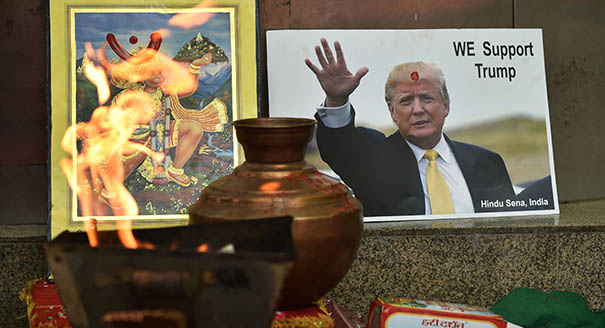Registration
You will receive an email confirming your registration.
As Carnegie India completes its first year in New Delhi, Carnegie India hosted a reflection on the extraordinary turbulence in the international system today and the policy challenges that it presents for India. Many dominant assumptions in Delhi about economic globalization, movement of goods and people across borders, multilateral institutions, and great power politics are now in question amidst the political discontinuity in Washington and several other key capitals marked by the election of Donald Trump as the president of the United States last November. Leading this reflection were William J. Burns, Ashley J. Tellis, Sanjaya Baru, Indrani Bagchi, and C. Raja Mohan.
Discussion Highlights
- The United States and the International Order: Participants noted that there is a remarkable discontinuity in the way that the U.S. leadership looks at its role in the rest of the world. The internationalist strain of thought, dominant in the United States for the last two decades, is now being challenged. President Trump, a discussant suggested, is an example of a nationalist viewpoint and therefore is skeptical about the intrinsic value of the international order. Further, the discussant added, irrespective of how long President Trump serves in office, the phenomenon and ideology that he represents will not fade away. The participant argued that since Trump is a nationalist who has inherited an international order, he will need to negotiate between the United States and the international system, between the administration and U.S. society, and within the administration itself.
- Indo-U.S. Relations: Discussants pointed out that assumptions underpinning the closeness of Indo-US relations over the last two decades are no longer valid. A participant noted that just as India is warming up to being a part of the international order, the United States seems poised to withdraw from it. Participants noted that the diminishing U.S. role in international affairs will open up space for China, which would be fundamentally detrimental to Indian interests. Another speaker pointed out that the fundamentals of U.S. power have not changed, and given that President Trump has included a number of traditional foreign policy experts in his administration, the essence of the Indo-U.S. relationship is unlikely to significantly change. A participant further maintained that while currently a lot of the traditional U.S. values are under siege, these values will not disappear. The speaker affirmed that the United States would continue with immigration policies designed to take advantage of global skills and talent, and would not walk away from the multitude of alliance it anchors.
- The Way Forward for India: Speakers said that, given the current period of uncertainty in international affairs, India must to take certain actions to protect its own interests. These include:
- Fundamentally altering its thinking about geography and geopolitics. India will have to shed its traditional conception of the world as a single geographical entity, and refocus on the Eurasian landmass.
- Adopting a more transactional approach in international relations. There is going to be a significant shift in relations among the other big powers, which means that India has to be more dynamic in its approach to international affairs generally, and great-power relations specifically.
This event summary was prepared by R. Shashank Reddy, a research assistant at Carnegie India.
Agenda
10:30 to 11:00 a.m.
Registration
11:00 to 11:15 a.m.
Carnegie India’s First Year: A Report
C. Raja Mohan
11:15 to 11:45 a.m.
A Global Order in Flux
William J. Burns, C. Raja Mohan
11:45 a.m. to 12:45 p.m.
The Trump Challenge and India’s New Imperatives
Speakers: Ashley J. Tellis, Sanjaya Baru, C. Raja Mohan
Moderator: Indrani Bagchi
12:45 to 1:00 p.m.
Closing Remarks
Shivnath Thukral
1:00 to 2:00 p.m.
Lunch
Speakers
Indrani Bagchi
Indrani Bagchi is senior diplomatic editor with the Times of India.
Sanjaya Baru
Sanjaya Baru is the director for Geoeconomics and Strategy, International Institute of Strategic Studies, London, and honorary senior fellow at the Center for Policy Research. From May 2004 until August 2008, Dr. Baru was the official spokesman and media adviser for the prime minister of India.
William J. Burns
William J. Burns is president of the Carnegie Endowment for International Peace. He previously served as U.S. deputy secretary of state.
C. Raja Mohan
C. Raja Mohan is director of Carnegie India. A leading analyst of India’s foreign policy, Mohan is also an expert on South Asian security, great-power relations in Asia, and arms control.
Ashley J. Tellis
Ashley J. Tellis is a senior associate at the Carnegie Endowment for International Peace specializing in international security, defense, and Asian strategic issues.
Shivnath Thukral
Shivnath Thukral is managing director of Carnegie India.














